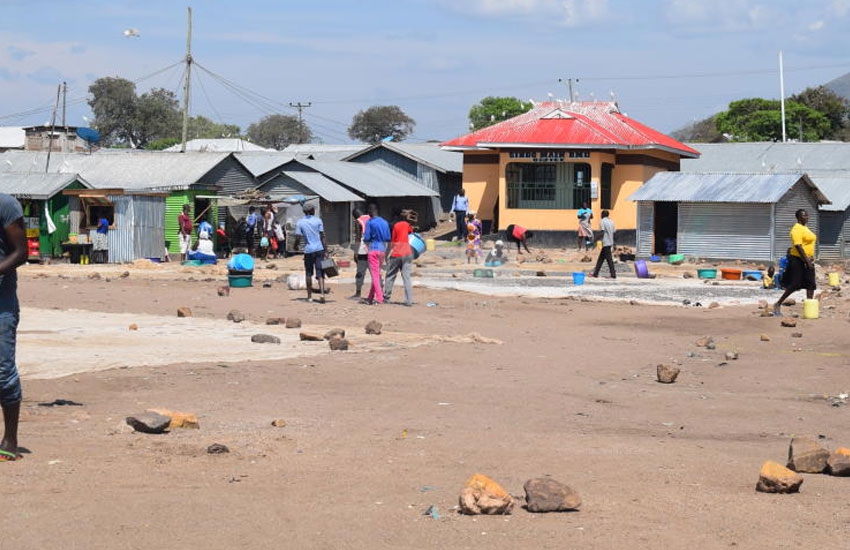
Crazed motorcyclists speed along the dusty streets. Dogs bark aimlessly as they run through the alleys of the busy township. The open air market is teeming with fish sellers.
It is a typical day at Sindo, the lakeside township in Homa Bay County where a new lifestyle is raising a storm.
Here, unmarried women outnumber men.
But what has caught the attention of local leaders is the increasing cases of come-we-stay unions whereby one woman can cohabit with up to five different men in a span of even three months.
A man too can get married to five different women in a span of one year.
Locally known as puk, iyier (dispose and choose), the new lifestyle has put Sindo town and neighbouring beaches under the government’s microscope as officials fight to stop it.
Under puk, iyier, fishermen (most of them immigrant) “marry” and live with women for short periods, then they part ways and pick new partners.
A three-day investigation by the Saturday Standard discovered that more than 50 per cent of the fishing community practice puk, iyier even as health records indicate this could be part of the reason why there is rise in number of HIV infections and other sexually transmitted infections in the area.
The HIV prevalence in Homa Bay stands at 20.7 per cent.
Village elders
It is said that the practise has become rampant because Sindo town, which lies along the shores of Lake Victoria is occupied by people from different parts of the country.
Some of the fisherfolk come from as as far as Uganda, Tanzania and the Democratic Republic of Congo. Disgruntled people whose marriages have broken report to village elders and beach management units who refer them to the chief and county commissioner.
A number of cases are not reported.
Wadiang’a village elder Michael Otieno says more than 15 people report cases of broken marriages to his office weekly. Majority of the complainants are women.
“On Wednesday, four women came to my office complaining that their husbands had abandoned them. Most were pursuing their property,” Otieno says.
The Beach Management Unit Vice-Chairman Anton Juma says his office receives at least six complaints every week.
“Many victims come to our office to seek intervention when their short marriages go sour,” Juma says.
Akeyo is nursing a broken heart after her husband abandoned her two weeks ago. She has a daughter.
The man moved to a different house in the same neighbourhood where he lives with another woman.
“We were married for only eight months and he has already abandoned me,” Akeyo says.
“I am appealing to the government to help me get my household goods,” she adds.
Akoth abandoned her husband, John, last month and got “married” to another man the neighbourhood.
“I suffered in the hands of my previous husband, he used to have sex with other women. I decided to dump him and get myself another husband,” Akoth says.
Juma, also a victim of the lifestyle argues that the situation forces residents to practice puk, iyier.
He says he had to terminate marriage to his first wife over infidelity in November 2017.
“I would leave my house at dawn and return in the evening. It was hurting to discover that other fishermen were having sex with my wife during the day,” Juma says.
She got another husband from the area and Juma also moved on and got himself a partner.
What is surprising is that people who dislike the lifestyle are sometimes forced to practice it.
Bob Otieno, a 23-year-old fisherman complained to the village elder that his neighbour threatened to kill him for refusing to marry her daughter.
Unstable families
The bride in question had already been married elsewhere and the mother wanted her to leave that union.
“My neighbour wants her daughter to walk out of her marriage so that I marry her. I am not ready to practise puk, iyier because I already have a wife,” Otieno says.
Central Division Assistant County Commissioner, Abdimalik Johar says puk, iyier has led to an increase in unstable families.
“Hopping with children from one family to another interferes with their welfare,” Johar says.
The county’s Health Department has also raised concerns over the matter.
Adel Ottoman, County Director of Public Health says records indicate that between January and June this year, 697 people were infected with HIV while 197 others contracted STIs.
“Sub-counties along the lake including Suba constitute the highest HIV prevalence at 33 per cent,” Ottoman says.
 The Standard Group Plc is a multi-media organization with investments in media
platforms spanning newspaper print
operations, television, radio broadcasting, digital and online services. The
Standard Group is recognized as a
leading multi-media house in Kenya with a key influence in matters of national and
international interest.
The Standard Group Plc is a multi-media organization with investments in media
platforms spanning newspaper print
operations, television, radio broadcasting, digital and online services. The
Standard Group is recognized as a
leading multi-media house in Kenya with a key influence in matters of national and
international interest.









